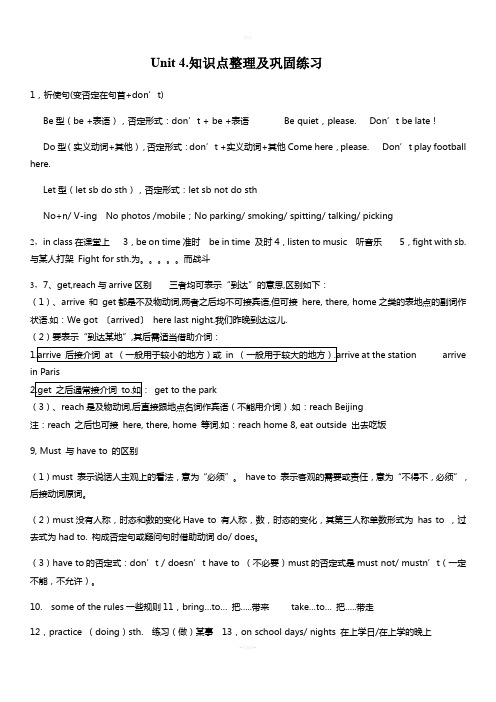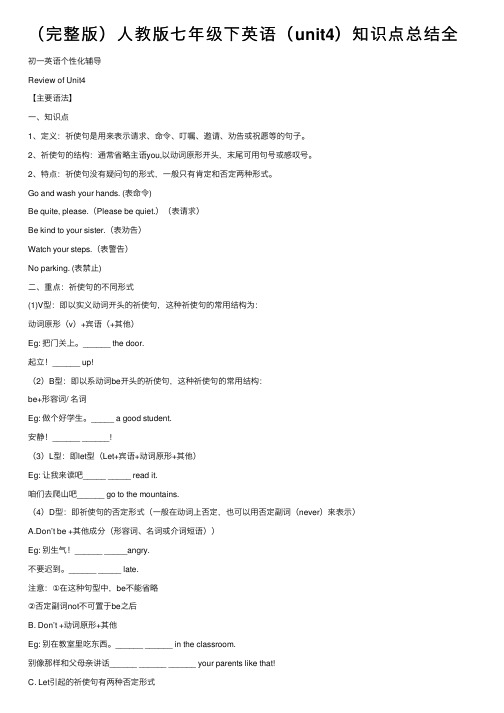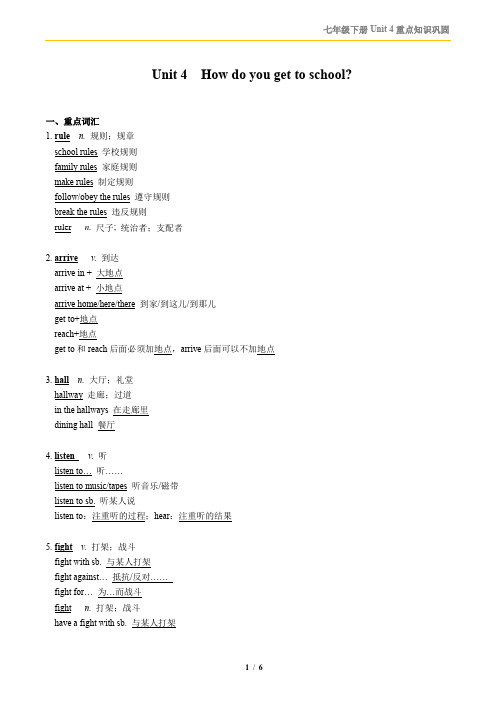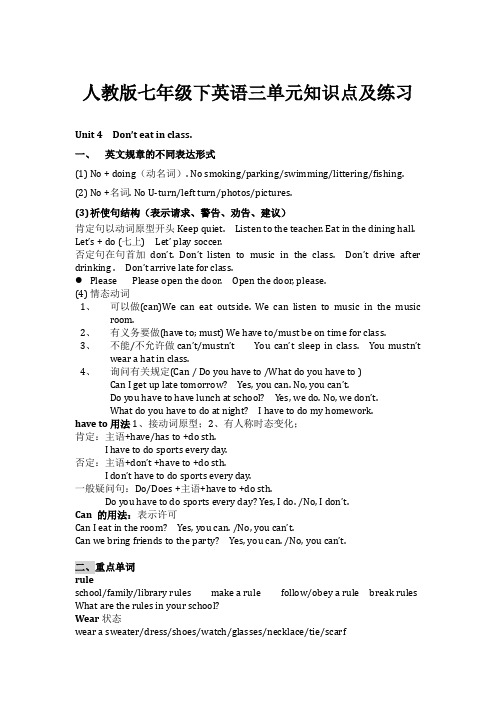七年级英语下Units 4-5重点知识与练习
人教版七年级英语下册4单元知识整理及巩固练习

Unit 4.知识点整理及巩固练习1,祈使句(变否定在句首+don’t)Be型(be +表语),否定形式:don’t + be +表语Be quiet,please. Don’t be late!Do型(实义动词+其他),否定形式:don’t +实义动词+其他Come here,please. Don’t play football here.Let型(let sb do sth),否定形式:let sb not do sthNo+n/ V-ing No photos /mobile;No parking/ smoking/ spitting/ talking/ picking2,in class在课堂上3,be on time准时be in time 及时4,listen to music 听音乐5,fight with sb. 与某人打架Fight for sth.为。
而战斗3,7、get,reach与arrive区别三者均可表示“到达”的意思,区别如下:(1)、arrive 和get都是不及物动词,两者之后均不可接宾语,但可接here, there, home之类的表地点的副词作状语.如:We got 〔arrived〕here last night.我们昨晚到达这儿.(2)要表示“到达某地”,其后需适当借助介词:arrive in Parisget to the park(3)、reach是及物动词,后直接跟地点名词作宾语(不能用介词).如:reach Beijing注:reach 之后也可接here, there, home 等词.如:reach home 8, eat outside 出去吃饭9, Must 与have to 的区别(1)must 表示说话人主观上的看法,意为“必须”。
have to 表示客观的需要或责任,意为“不得不,必须”,后接动词原词。
(2)must没有人称,时态和数的变化Have to 有人称,数,时态的变化,其第三人称单数形式为has to ,过去式为had to. 构成否定句或疑问句时借助动词do/ does。
人教版初一七年级英语(下)第四单元Unit4知识点、语法+练习题、测试

Unit 4 Don’t eat in class.1.到达_________________________get +______________ reach+_________Mr. Wang arrived _____ London yesterday.I arrive __________(home) at 4:00 in the afternoon.Don’t arrive late for class. arrive late for= be late for2. 准时,按时_____________ in time____________你一定要守时。
You must be ____________.救护车及时赶到。
The ambulance arrives _____ time.3. 听音乐________________ 听_________ 听见___________4. 在课上,上课时_____________ 在课下,下课后_________________in the class: 在班上,在班级里in the classroom: 在教室里Do you listen to your teacher carefully __________? 你在课上认真听老师讲课吗?这个班里有40个学生。
There are 40 students ________________.5. fight v./n. _________ 和某人打架______________= have a fight with sb. Stop fighting, you two! Why do you sometimes fight ______ others?6.Mr._______ 女士(不知婚否)________ Mrs.________小姐___________--Don’t smoke here, please.--______.A. I don’tB. Sorry, I won’t.C. No wayD. I will7. 在外面_________ inside_________Don’t stay inside all the time. Let’s go ________ to play.8. 戴帽子___________ wear: 穿戴+衣帽,饰物,奖章等。
(完整版)人教版七年级下英语(unit4)知识点总结全

(完整版)⼈教版七年级下英语(unit4)知识点总结全初⼀英语个性化辅导Review of Unit4【主要语法】⼀、知识点1、定义:祈使句是⽤来表⽰请求、命令、叮嘱、邀请、劝告或祝愿等的句⼦。
2、祈使句的结构:通常省略主语you,以动词原形开头,末尾可⽤句号或感叹号。
2、特点:祈使句没有疑问句的形式,⼀般只有肯定和否定两种形式。
Go and wash your hands. (表命令)Be quite, please.(Please be quiet.)(表请求)Be kind to your sister.(表劝告)Watch your steps.(表警告)No parking. (表禁⽌)⼆、重点:祈使句的不同形式(1)V型:即以实义动词开头的祈使句,这种祈使句的常⽤结构为:动词原形(v)+宾语(+其他)Eg: 把门关上。
______ the door.起⽴!______ up!(2)B型:即以系动词be开头的祈使句,这种祈使句的常⽤结构:be+形容词/ 名词Eg: 做个好学⽣。
_____ a good student.安静!______ ______!(3)L型:即let型(Let+宾语+动词原形+其他)Eg: 让我来读吧_____ _____ read it.咱们去爬⼭吧______ go to the mountains.(4)D型:即祈使句的否定形式(⼀般在动词上否定,也可以⽤否定副词(never)来表⽰)A.Don’t be +其他成分(形容词、名词或介词短语))Eg: 别⽣⽓!______ _____angry.不要迟到。
______ _____ late.注意:①在这种句型中,be不能省略②否定副词not不可置于be之后B. Don’t +动词原形+其他Eg: 别在教室⾥吃东西。
______ ______ in the classroom.别像那样和⽗母亲讲话______ ______ ______ your parents like that!C. Let引起的祈使句有两种否定形式a. Let+宾语+not+动词原形+其他Let her not do that.Let’s not think about it. It’s only a waste of time.b. Don’t+ let+宾语+动词原形+其他Don’t let Jim do that.Don’t let us go, please.三、难点:1、特殊形式的祈使句(1)在公共场合的提⽰语中,否定祈使句常⽤“No+名词/ V-ing形式”结构,表⽰“禁⽌做某事”。
初中英语人教版七年级下册Unit 4 单元知识巩固练习(附参考答案)

七年级英语下册Unit4知识巩固练习班级考号姓名总分一、单项选择题1.— Can I listen to music in class?— _____.But you can do it after class in the hallways.A.Yes, pleaseB.No, you can’tC.No, you don’tD.Yes, you can2.— When do you arrive _____ school every day?—_____ eight o’clock.A.at; AtB.in; InC.in; AtD.at; In3.Please _____ my English book here.I need it.A.takeB.bringC.to takeD.to bring4.We should keep quiet in the library.We _____ speak loudly( 大声地).A.mustB.mustn’tC.canD.needn’t5.I _____ go now, or I’ll miss my train.A.canB.mightC.mustD.could6.He _____ stay at home, because it’s rai ning outside.A.have toB.has toC.mustD.can’t7.—Do your parents let you watch TV on school nights?—No.They are ______ with me.A.kindB.strictC.difficultD.busy8.For our safety, we must ______ the traffic rules on the way to school.A.followB.changeC.makeD.break9.The bed ______soft and comfortable.It sells well.A.soundsB.tastesC.feelsD.smells10.—I’m not sure where to buy the ticket.—Sorry, I’ve no idea_____.A.eitherB.tooC.alsoD.so11.My daughter helps me cook, but she isn’t old enough to be left alone in the______.A.bedroomB.classroombD.kitchen12.I often have no time to play with my friends because I have______ homework to do every day.A.too manyB.too muchC.many tooD.much too13.—What does your father do after dinner?—He usually ______ newspapers.A.readsB.watchesC.looksD.sees14.Remember ____ me after you get home.A.callB.callingC.to callD.calls15.—Must I give it back today?—No, you ____.You can have the book till next week.A.can'tB.mustn'tC.don't have toD.don't need16.My parents are strict ____ me ____ everything.A.with; inB.in; toC.with; toD.in; with17.—____ you come to my party on Sunday?—Sorry, I'm not available.I____ study for the math test.A.Can; mustB.Must; canC.Need; mayD.May; can18.—What do you think of the news?—I feel ____.So many people got lost in the mountains.A.busyB.funnyC.happyD.sorry19.—Do you think Bob is a good boy?—No, I don't think so.He often ____with others.A.helpsB.playsC.fightsD.talks20.—Do you know the way to Bayi Park?—Yes, ____me and I will show you.A.callB.keepC.followD.drive二、用所给单词的适当形式填空1.Emily practices ________ (speak) Chinese every day.2.Tom always does the ________ (dish) after supper.3.Danny has many family ________ (rule) in his house.4.I often help my mom _________ (make) breakfast.5.Gina usually _______ (relax) herself by listening to music.6.It was too ______ (noise)in the supermarket so I didn’t hear the phone.三、按要求完成下列各题1.Talk in class. (改为否定句)______ ______ in class.2.I have to do my homework after school. (对画线部分提问)______ ______ you ______ ______ ______ after school?3.We have to listen to the teacher. (改为一般疑问句并作肯定回答)______ we ______ ______ listen to the teacher?______, we ______.4.She has to wear the uniform at school. (改为一般疑问句,并作否定回答) _____ she _____ to wear the uniform at school?_____, she _____.5.We can run in the hallways. (改为否定句)We _____ run in the hallways.附:参考答案一.单项选择题1-5 BABBC 6-10 BBACA 11-15 DBACC 16-20 AADCC二.用所给单词的适当形式填空1.speaking2.dishes3.rules4.(to)make5.noisy三.按要求完成下列各题:1.Don't talk2.What do have to do3.Do have to,Yes do4.Does have,No,doesn't5.can't。
人教版七下英语unit4语法知识点

人教版七下英语unit4语法知识
点
wear v.穿着:戴着(状态)接衣帽、饰物等 wear a
skirt/hat/watch wear masks戴口罩 wear a smile面带微笑put on穿上;戴上(动作) Put on your sweater!穿上你的毛衣!
Section A
important adj.重要的 it s important for sb.to do sth.做某事对某人来说是重要的 It's very important for us to wear masks now.现在戴口罩对我们来说是非常重要的。
importance n.重要性 the importance of health健康的重
要性
quiet adj.形容词安静的(修饰n.或放be/系动词后)
quite adv.副词很,非常(相当于very) be quiet/keep quiet/stay保持安静 We have to be/keep quiet in the library.在图书馆里我们必须保持安静
情态动词must表示“必须;务必用法:主语+must+动词原形+其他例句:You must wear the school uniform at school。
【最新】人教版七年级英语下册unit4重难点讲解和练习

Unit 4 Don't eat in class.知识点总结◆短语归纳1. in class 在课上in the classroom 在教室里2. arrive late for class = be late for class上课迟到3. (be) on time 准时in time及时4. fight with sb. 和某人打架5. eat in the dinning hall在餐厅吃东西6. must + 动词原形必须做某事= have to + 动词原形. 不得不做某事7. bring…to…把…带到…来8. eat outside 在外面吃饭9.wear a school uniform 穿校服10. practice the guitar 练习吉它practice playing the guitar 练习弹吉他11. on school nights在上学的晚上on school days在上学的日子12. too many + 可数名词复数too much + 不可数名词表示太多…13. make one’s bed 铺床make breakfast 做早饭make friends 交朋友14. make rules 制定规则follow the rules 遵守规则break the rules 违反规则15. keep quiet= be quiet 保持安静be noisy吵闹16. keep hair short 留短发17. do the dishes 清洗餐具18. wear a hat 戴帽子19. listen to…听…20. learn sth. 学习某事learn to do sth. 学习做某事21. have fun (doing sth)玩得高兴22. be strict (with sb.) 对某人严格◆语法归纳一、祈使句:1.祈使句是用来表示请求、命令、叮嘱、邀请、劝告或祝愿等的句子。
人教版英语七年级下册全册知识点讲解与单元测试卷人教版英语七年级下册Unit 4 Don't eat

人教版英语七年级下册Unit 4 Don't eat in class知识点总结及单元测试卷(附答案)【教材内容解析】Section A1.Don’t arrive late for class. (P. 19)arrive作不及物动词,表示“到达”,接宾语时,需要加上介词in或者at。
When did you arrive?We are arriving at the station at two o’clock.【拓展】reach表示“到达”时,是及物动词,后面直接接表示地点的名词作宾语。
另外两个表示“到达”的动词(get和arrive)都是不及物动词,get to+地点;arrive in/at+地点。
After a long way, they reached/got to/arrived at the top of the mountain finally.2.You must be on time. (P. 19)on time用作固定短语,表示“准时、按时”,in time表示“及时”。
The train arrives on time.The ambulance arrives in time.3.Don’t listen to music in class. (P. 19)listen用作不及物动词,表示听的动作,后接宾语时,需要加上介词to,hear强调听的结果,表示“听到”。
This girl likes to listen to music.Can you hear anything?4.Don’t fight. (P. 19)fight此处用作动词,意为“打架”,fight with sb.意为“与某人打架”。
Why do you sometimes fight with others?5.listen to music outside (P. 20)outside表示“在外边”,反义词为inside“在……里面”。
人教版七年级下册unit4重点知识巩固(教师版)

Unit 4 How do you get to school?一、重点词汇1. rule n. 规则;规章school rules 学校规则family rules 家庭规则make rules 制定规则follow/obey the rules 遵守规则break the rules 违反规则ruler n.尺子; 统治者;支配者2. arrive v.到达arrive in + 大地点arrive at + 小地点arrive home/here/there 到家/到这儿/到那儿get to+地点reach+地点get to和reach后面必须加地点,arrive后面可以不加地点3. hall n.大厅;礼堂hallway 走廊;过道in the hallways 在走廊里dining hall 餐厅4. listen v.听listen to… 听……listen to music/tapes 听音乐/磁带listen to sb. 听某人说listen to:注重听的过程;hear:注重听的结果5. fight v.打架;战斗fight with sb. 与某人打架fight against… 抵抗/反对……fight for… 为…而战斗fight n.打架;战斗have a fight with sb. 与某人打架6. sorry adj.抱歉的;难过的;惋惜的be sorry to do sth. 很抱歉(难过)做某事I’m sorry that… 很抱歉/难过……I’m sorry to hear that. 很难过听到那件事。
I’m sorry = I’m afraid not.7. outside adv. 在外面eat outside 去外面吃反义词:inside 在里面8. wear v. 穿;戴wear a uniform/uniforms 穿校服wear glasses/earrings/a hat/gloves/a scarf 戴眼镜/耳环/帽子/手套/围巾put on强调穿戴的动作wear强调穿戴着的状态underwear n.内衣;底裤9. important adj.重要的be important to do sth. 做某事很重要It is important for sb. to do sth.play an (important) role in +n./doing...= play an(important) part in+n./doing ...在...方面起作用/在...中扮演角色unimportant adj. 不重要的importance n. 重要性importantly adv. 重要地10. bring v.带来bring sth. to 地点把某物带到某地bring good luck to... 给...带来好运bring sb. sth. = bring sth. to sb. 给某人带来某物反义词:take v.带走;拿走11. quiet adj.安静的be /keep quiet/ silent 保持安静quietness n. 安静quietly adv.安静地walk quietly 安静地走quite adv. 相当地12. out adv.外出go out 外出13. practice v.练习practice sth. /doing sth. 练习某事/做某事Practice makes perfect. 熟能生巧。
新目标七年级下册英语Unit 4、5重点词句汇总

新目标七年级下册英语Unit 4、5重点词句汇总新目标七年级下册英语Unit4、5重点词句汇总Unit4Iwanttobeanactor.一.短语:wanttodosth想要作某事2givesbsth=givesthtosb给某人某物/把某物给某人3helpsbdosth帮助某人作某事,如:Iwanttohelpmymotherdosomehouseworkathome.我想在家帮我母亲做家务4helpsbwithsth帮助某人谋事如:Iwanttohelpmymotherwithsomehouseworkathome我想在家帮我母亲做家务5talkwith/tosb和----谈话6bebusydoingsth忙于做某事=bebusywithsth.Eg:Heisbusylisteningtotheteacher.他忙于听老师讲。
7inahospital在医院inhospital住院8work/studyhard努力工作/学习9EveningNewspaper晚报0.get…from…从……得到……1.wantsbtodosth想要某人做某事二.重点句式及注意事项:询问职业的特殊疑问词是what;有三种主要句式①what+is/are+sb?如:what’she?②what+does/do+sb+do?如:whatdoeshedo?③what+is/are+名词所有格/形容词性物主代词+job?如:whatisyourjob?2Peoplegivemetheirmoneyorgettheirmoneyfromme.人们把钱给我或从我这里取钱3SometimesIworkinthedayandsometimesatnight.有时我在白天,有时在晚上工作4Iliketalkingtopeople.我喜欢和人交谈。
5Iworklate.I’mverybusywhenpeoplegoouttodinners.我工作到很晚,当人们外出吃饭时我非常忙。
人教新目标英语七年级下册unit4--5知识点总结

人教新目标英语七年级下册知识点归纳总结unit 4 Don’t eat in class.Section A1. arrive late for 迟到,侧重到达的时间晚be late for 迟到侧重于状态arrive late for class/school. = be late for class/school. 上课/上学迟到2.on time准时按规定时间或指定时间做某事不早不晚in time及时不迟到或在规定时间之前或接近所规定时间做某事没有迟到,时间还充裕He always go to school on time.他总是按时上学。
Fireman reached the house on fire in time.消防员及时赶到那幢失火的房子。
3.祈使句表示请求,命令或建议祈使句无主语,主语you常省去,动词原形谓语当,句首加don’t否定变朗读应当用降调,句末常标感叹号。
肯定的祈使句(1)实义动词原形+其他Have a seat here. 请这边坐。
(2)be动词原形+形容词+其他Be a good boy!(3)Let sb do sth. Let me help you. 让我来帮你。
(4)有的祈使句在意思明确的情况下,动词可省略。
This way, please. = Go this way, please. 请这边走否定的祈使句(1)Don’t+实义动词+原形Don’t forget me!不要忘记我!(2) Don’t be+形容词+其他Don’t be late for school!上学不要迟到!(3) Don’t let sb do sth Let +宾语+ not + 动词原形+其它成分Don’t let him go. / Let him not go.别让他走。
(4) No+Ving. No smoking! 禁止吸烟! No fishing! 禁止钓鱼4. hear listen sound 听hear听说侧重于听的内容I'm sorry to hear that you are ill. 听说你生病了我很难过。
人教版七年级下英语四单元知识点及练习

人教版七年级下英语三单元知识点及练习Unit 4 Don’t eat in class.一、英文规章的不同表达形式(1)No + doing(动名词). No smoking/parking/swimming/littering/fishing.(2)No +名词. No U-turn/left turn/photos/pictures.(3)祈使句结构(表示请求、警告、劝告、建议)肯定句以动词原型开头Keep quiet. Listen to the teacher. Eat in the dining hall. Let’s + do (七上) Let’ play soccer.否定句在句首加don’t. Don’t listen to music in the class. Don’t drive after drinking . Don’t arrive late for class.Please Please open the door. Open the door, please.(4)情态动词1、可以做(can)We can eat outside. We can listen to music in the musicroom.2、有义务要做(have to; must) We have to/must be on time for class.3、不能/不允许做can’t/mustn’t You can’t sleep in class. You mustn’twear a hat in class.4、询问有关规定(Can / Do you have to /What do you have to )Can I get up late tomorrow? Yes, you can. No, you can’t.Do you have to have lunch at school? Yes, we do. No, we don’t.What do you have to do at night? I have to do my homework.have to用法1、接动词原型;2、有人称时态变化;肯定:主语+have/has to +do sth.I have to do sports every day.否定:主语+don’t +have to +do sth.I don’t have to do sports every day.一般疑问句:Do/Does +主语+have to +do sth.Do you have to do sports every day? Yes, I do. /No, I don’t.Can 的用法:表示许可Can I eat in the room? Yes, you can. /No, you can’t.Can we bring friends to the party? Yes, you can. /No, you can’t.二、重点单词ruleschool/family/library rules make a rule follow/obey a rule break rules What are the rules in your school?Wear状态wear a sweater/dress/shoes/watch/glasses/necklace/tie/scarf*put on Put on your shoes quickly.important adj.an important meeting/party Exercise is important to/for us.It’s important to have healthy eating habits.bring 副词home/here/there前不加介词to for sb. Please bring your family photo to school.Can I bring my dog to school?*take…to…some some ofpron. Some of my friends like to play chess. Some of the food taste good. adj. some water/boyspractice/practicepractice the guitar/playing the guitar practice soccer/playing soccer help help sb.(to)do sth. * help (to) dohelp me do housework/my mom make breakfast.Before *afterprep. before dinner/9:00conj. He does homework before he goes to bed.either adv. 用于否定句I can’t dance, either.read *readerread books/newspaper. He likes reading.*look at (动作)see(结果)watch(带有观赏性质)read(文字)feelHow are you feeling? feel terrible nowlearn(强调由不会就到会) *learnerlearn English/math learn (how)to swim/sing learn from Leifeng三、重点词组arrive late for class/school/work *be late for class/schoolarrive in Beijing/at schoolon time *it is time for sth.We must be on time for class/get to school on timelisten tolisten to music/the radio/me/the teacher*hear(结果)in class/in the classroomDon’t talk/sleep in class.In the classroom he is the tallest.a lot ofa lot of milk/books many books/much milkdo the dishes wash the dishesmake one’s/the bedYou have to make the bed every day.too manytoo many students/bookstoo much time/homeworkbe strict with His mom is strict with him/his homework.四、重点句子Good luck.I will have a test next week. Good luck to you.I have to keep my hair short.Keep+ n./pron.+adj.The sweater can keep you warm.You must keep the classroom clean.第四单元练习题用所给词的适当形式填空1._____(not leave) the dirty dishes in the kitchen.2.I run to school because I can’t _____(be) late.3.My dads says I can’t ____(play) basketball after school because I must ____(do)my homework.4.I have to _____(go) to bed before 10:00.5.I have to _____(learn) _____(play) the piano.6._____(eat)in the dining hall, please.7.We must ____(be) on time.单项选择1._____ in the hallways.A. not runB. don’t runC. Don’t runD. No run2.Don’t listen ____ music in class.A. toB. inC. asD. for3.We can’t arrive late ____ class.A. inB. forC. onD. to4.___ he ___ to wear a uniform at schoolA. Do, haveB. Do, hasC. Does, have D .Does, has5.What _____ the rules?A.are B. is C. am D. be6.There are _____ rules.A. too muchB. too manyC. much tooD. many too7.I can play only _______weekends.A. onB. inC. forD. to8. You can watch TV after you ____ a book.A. readsB. readingC. readD. to read9.After dinner, I can’t relax, ______A. tooB. alsoC. eitherD. to10.I have fun ______ basketball.A. playB. playingC. playsD. to play11. Don’t go out school nights.A. inB. atC. on12. For many students ,it’s easy ping-pong.A. playB. playingC. to play13. She is afraid dogs.A. of B .in C. at14. Please bring a notebook school.A. inB. forC. to15.Tom’s father is always strict him.A. withB. inC. about16.He wants to go out volleyball.A. play B .to play C. plays1.I often practice English.2. A. speak B. talk C. speaking3.He has to go to bed before 10:00.(改为一般疑问句)he to go to bed before 10:004.Li Chen has to go to school in the afternoon.(改为否定句)Li Chen go to school in the afternoon.5.They have to listen to music in the music room.(对划线部分提问)they in the music room6.你认为他们的梦想能实现吗?Do you think their can7.对我来说,他就像我的爸爸。
七年级英语下册 Unit 4-5 复习 (新版)人教新目标版

Unit 4---Unit 5名词类(n.)1.规则;规章__________2.走廊__________3.大厅;礼堂__________4.打架__________5.校服;制服__________6.练习__________7.碟;盘__________8.厨房__________9.幸运;运气__________10.头发__________11.纽约__________12.熊猫__________13.动物园__________14.老虎__________15.大象__________16.树袋熊__________17. 狮子__________18.长颈鹿__________19.动物__________20.种类__________21.澳大利亚__________22.南方__________23.非洲__________24.宠物__________25.腿__________26.猫__________27.睡觉__________28.象征__________29.旗帜__________30.地点;位置__________31.水__________32.危险__________33.树__________动词类(v.)1.到达______2.听______3.打架;战斗_______-_______-_______4.穿;戴______-________-______5.带来;取来______-_______-_______6.练习__________7.放松;休息_________8.读_____-_______-______9.感受;觉得_____-________-_______10.记住;记起_____________11.遵循;跟随_________12.保持;保留______-_______-_______13.学习;学会______-_______-_______14.睡觉______-_______-______15.救助__________16.忘记;遗忘_______-_________-_________17.砍;切______-_______-_______18.杀死;弄死________-19.违反;打破_____-________-______形容词类(adj.)1.抱歉的;难过的__________2.重要的__________3.安静的__________4.脏的__________5.更多的__________6.吵闹的__________7.非常讨厌的;可怕的__________8.严格/严厉的;__________9.可爱的;机灵的__________10.懒惰的__________11.聪明的__________12.美丽/好的__________13.吓人的;恐怖的__________14.南方的__________15.友好的__________16.羞怯的;腼腆的__________17.外面的__________副词(adj.)、介词(prep.)、连词(conj.)1.在外面__________2.外出__________3.在。
期末复习人教版七年级英语下册Unit4解析词汇、句型解析及练习(有答案)

期末复习人教版七年级英语下册Unit4解析词汇、句型解析及练习(有答案)期末复习人教版七年级英语下册unit4解析词汇、句型解析及练习Unit4 Don't eat in class!01词汇讲解1. arrive1)arrive 意为“到达”。
arrive at+小地点,arrive in +大地点。
例如:I will arrive in Beijing next week. 我下周到北京。
I arrived at the small village on a cold morning.在一个寒冷的早晨我到达了那个小村庄。
2)arrive 后面跟地点副词here, there, home时,不需要跟介词。
例如:arrive home 到家arrive here 到这儿注意:arrive late for与be late for是同义短语,都表示“做某事迟到”的意思。
arrive late for 强调动作晚,be late for 侧重状态晚。
例如:Don’t arrive late for the next test.=Don’t be late for the next test.下一次考试不要再迟到了。
2. listenlisten 是不及物动词,意为“听,倾听”,强调听的动作,后面接宾语时要加上介词to。
例如:We should listen to the teacher carefully.我们应该认真听老师讲课。
Listen! Someone is singing in the garden.听! 有人在花园里唱歌。
拓展:hear, listen和sound的辨析三个词都有“听”的意思,具体区别如下:hear 意思是“听说,听到”,侧重听到的内容。
例如:I heard someone cry in the next room last night.昨晚我听见有人在隔壁哭。
listen意思是“听”,侧重听的动作。
- 1、下载文档前请自行甄别文档内容的完整性,平台不提供额外的编辑、内容补充、找答案等附加服务。
- 2、"仅部分预览"的文档,不可在线预览部分如存在完整性等问题,可反馈申请退款(可完整预览的文档不适用该条件!)。
- 3、如文档侵犯您的权益,请联系客服反馈,我们会尽快为您处理(人工客服工作时间:9:00-18:30)。
七年级英语下Units 4-5重点知识与练习Unit 4 I want to be an actor.一.短语:1 want to do sth2 give sb sth = give sth to sb3 help sb do sth4 help sb with sth5 in the day6 at night7 talk with/ to sb8 be busy doing sth9 in a hospital 10 work/ study hard 11 Evening Newspaper二.重点句式1 询问职业的特殊疑问词是what;有三种主要句式①What + is / are + sb? Eg. What is your mother?②What + does/ do + sb + do? Eg. What does his brother do?③What + is/ are + 名词所有格/ 形容词性物主代词+ job? Eg . what is your job?2 People give me their money or get their money from me.3 Sometimes I work in the day and sometimes at night.4 I like talking to people.5 I work late. I’m very busy when people go out to dinners.6 Where does your sister work?7 then we have a job for you as a waiter.8 Do you want to work for a magazine? Then come and work for us as a reporter.9 Do you like to work evenings and weekends?10 We are an international school for children of 5-12.三.本单元中的名词复数。
1 policeman--policemen2 woman doctor--women doctors3 thief--thieves 4.apple tree--apple treesUnit 5 I’m watching TV一.短语:1.do one’s homework do housework 2.talk on the phone,talk about……talk to(with)sb 3.write a letter write a letter to sb 4.play with……5.watch TV TV show 6.wait for sb/sth 7.some of……8.in the first photo in the last photo a photo of one’s family 9.at the mall at/in the library at/in the pool 10.read a book = read books = do some reading 11.thanks for = thank you for二.重点句式及注意事项:1.What is he doing? He is eating dinner.Where is he eating dinner?He is eating dinner at home.2.When do you want to go? Let’s go at six o’clock.3.What is he waiting for? He is waiting for a bus.4.Who are they talking with? They are talking with Miss Wu.5.What are you talking about? We are talking about the weather.6.They are all going to school.7.Here are some of my photos.Here is some of meat.(some of meat不可数,故用is)8.Thank you for helping me buy this book.9.family 家;家庭。
强调“整体”,是单数;强调“成员”时,是复数。
His family has a shower. 他们家有一个淋浴。
His family are watching TV. 他全家在看电视。
单项选择()1. My father works in a restaurant. He is a(n) _______.A. reporterB. actorC. doctorD. waiter()2. We can’t see the stars ______ the day, but we can see them ____ night.A. in, atB. on, atC. in, onD. at, in()3. Thieves don’t like _____ father because _____ is a policeman.A. she, heB. her, sheC. her, heD. his, his()4. His work is busy but very ______.A. difficultB. dangerousC. boringD. interesting()5. Go and ____ your father the news.A. teachB. talkC. speakD. tell()6. Here is a _____ for you as an assistant.A. hobbyB. workC. jobD. story()7. What _____ your friend _______ to be?A. do, wantB. does, wantC. do, wantsD. does, wants()8. --- Do you often work_____?--- Yes, I do. I only sleep for five hours every day.A. rightB. wellC. lateD. straight()9. --- What do you like to _____?--- Hamburgers, please. I’m hungry.A. giveB. wearC. eatD. do()10. --- ______ is the boy?--- He is my brother.A. HowB. WhatC. WhereD. Who()11. I can’t afford the clothes. I have _____ money with me.A. manyB. muchC. lotD. little()12. She wants to be an actress ______ she thinks it’s an interesting job.A. ifB. orC. becauseD. but()13. --- Doesn’t Mike like his job?--- ________. He enjoys it.A. Yes, he is.B. No, he isn’t .C. Yes, he does.D. No, he doesn’t. ()14.--- _________?--- She is a clerk.A. What does your sister like to doB. What’s your sisterC. Where does your sister workD. How is your sister()15. This is a new pen. ______ pen is Tom’s.A. AB. AnC. TheD. /()16. --- What’s Jim doing?--- He is talking with his teacher_______ the phone.A. forB. inC. atD. on()17. Look! I have a camera. Let’s take some ________.A. computersB. birdsC. photosD. toys()18. --- What are they doing now?--- They are _____ a soccer game on TV.A. watchingB. readingC. seeingD. looking()19. --- What are they _____?--- The Chinese food.A. waiting toB. talking aboutC. writing toD. listening to()20. --- What do you think of the TV show?--- I don’t like it. It is ____.A. beautifulB. greatC. funnyD. boring()21. --- Here ____ some food for you. Help yourself.--- OK, thank you.A. haveB. isC. areD. has()22. --- Do you run every morning?--- Yes, but now I _____ . I’m swimming.A. runB. am runningC. don’t runD. am not running()23. --- What your mother doing?--- The floor is dirty ______ she is cleaning it.A. soB. butC. ifD. because()24. ---- What are you doing now?--- I _______ my room. I _____ it every afternoon.A. am cleaning , am cleaningB. clean, am cleaningC. am cleaning, cleanD. clean, clean完形填空Today, Mr Liu asks his students about their parents’ jobs. He asks the students to answer the questions, “What do your ___1__ do? And what do they often say at __2___ ? What do you think of their jobs?” The students ___3__ their answers down in their notebooks.Kate’s mother always says, “Can I help you ? __4___ do you want to eat? ” She is a waitress. Kate thinks her mother is too busy, so she doesn’t ___5___ her mother’s job.Jack’s father always says to thieves, “Don’t move !” He is a policeman. His job is __6____ , but kind of dangerous.Ben’s mother often says, “Come and see for __7___. We have great clothes at very good __8___ . ”She is very busy in the day, __9___ she really enjoys her work. She is always __10____. Ben likes the job, too.Mr Liu is happy to read the answers and find that the students start to think about jobs.( )1. A. families B. classes C. friends D. parents( )2. A. school B. home C. work D. store( )3. A. write B. find C. draw D. see( )4. A. Why B. What C. Who D. Where( )5. A. get B. give C. like D. pass( )6. A. exciting B. hard C. difficult D. boring( )7. A. myself B. yourself C. ourselves D. themselves( )8. A. places B. stories C. lists D. prices( )9. A. because B. after C. but D. if( )10. A. old B. hungry C. sad D. happy阅读理解I’m Susan from Beijing. I have four pen pals. They come from different countries. Do you()1. What may “Moscow” be?A. A boy’s nameB. A cityC. An animalD. A shop()2. Where is Julia from?A. The UKB. The USAC. ChinaD. France()3. Who is having lunch now?A. JackB. MaryC. JennyD. Julia()4. When it is 8:00 pm in Paris, what time is it in Moscow?A. 10:00 pmB. 8:00 pmC. 7:00 pmD. 2:00 pm()5. What can we know from the passage?A. Jack is having dinner now.B. Mary is in London now.C. It is in the evening in Paris now.D. Jenny is 13 years old.her mother and her younger brother.Ann’s father is a doctor. Her mother is a teacher. She _____ English. They are both thirty-nine _____ old. Ann’s grandfather and grandmother don’t’ ______ now. They are at home every day. Ann is ten and she is a _______ student. She likes English very much. Her ______ Tommy is only four years old. Tommy is very lovely _____ they all like him. He is always at home _____ his grandparents.Ann likes to _____ with her family. They are happy.根据首字母或汉语提示写单词补全句子。
